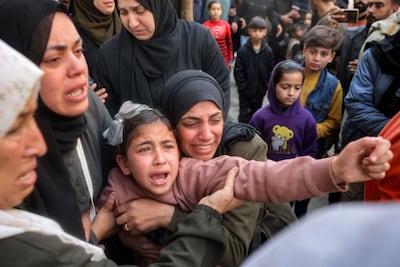Live updates: Follow the latest on Israel-Gaza
Israel launched attacks against Gaza after two months of pause last week, in the middle of Ramadan. The renewed violence has killed 896 people, leaving families grieving during a period which is traditionally about prayer, reflection, spending time with family and fasting.
In the coming days, the spotting of the crescent moon will bring Eid Al Fitr, the festival which celebrates the end of the holy month. It is usually a time for visiting friends and family, prayer, eating together and giving gifts. But most in Gaza are struggling to find the joy required when destruction has ruined entire neighbourhoods.
But parents told The National they were determined to help their children enjoy the celebrations, in the hope of bringing some normality to their devastated lives. Weaving through markets, many of which stand upon rubble, they try to buy goods to make traditional sweets.

Noha Abu Hani, 47, has been displaced from Jabalia camp by the war and now lives in an Unwra camp. This Eid, for the first time in two years, she will bake.
“Before the war, Eid Al Fitr in Gaza was a time of cherished traditions,” Noha told The National. “One of the most beloved customs was baking ka’ak [a type of biscuit in the shape of a ring] and ma’moul [a date-filled biscuit], filling the streets in the last days of Ramadan with the sweet aroma of freshly baked treats. It was a time of joy, togetherness.”
But last year, joy was unimaginable, she says. “I was trapped in northern Gaza with my family of five. We couldn’t bake, couldn’t celebrate. There were no ingredients, no way to make anything."
Traders have raised prices, sparked by the resumption of an Israeli blockade on goods coming into the enclave on March 1, But Noha says she is grateful nonetheless to be able to buy a few small ingredients. She decided to bake, "not because it feels like Eid, not because it brings happiness, but to remind the children that life still exists, even in these ruins”.
In Gaza, Eid has become a day of contradictions between pain and resilience, between grief and the stubborn insistence on life. Some Gazans were able to return to their hometowns in the north of the enclave for the first time in months during the ceasefire which began on January 19.
For Randa Abu Al Foul, 35, this Eid carries a glimmer of hope, despite the breakdown of the ceasefire. Unlike the past two Eids, she is no longer displaced in the south. She has returned to the north, to what remains of Gaza city.
“Yes, the war has resumed, and innocent lives continue to be lost, but many people are trying to push away the thoughts of death and war, to create an Eid atmosphere especially for the children.”
Randa, a mother of three sons and a daughter, did her best to uphold the traditions of Eid. “I took them to Al Rimal market and bought them Eid clothes, along with some chocolates and nuts."
“What makes me happy is that after leaving behind the life of displacement and returning to Gaza, I found that, despite the destruction, life still exists. The markets are open. People are wounded, grieving, but they are trying to live because they have no other choice.”

Randa’s home in Al Nasr neighbourhood was destroyed in the war. Now, she and her children live in Tel Al Hawa with her family. Her husband was injured in the war but she counts herself lucky.
Others, like Mohammed Al Sawarka, have lost more than their homes – more than 50,000 people have been killed in Gaza since the war broke out on October 7, 2023. For the 44-year-old, Eid is a cruel reminder of losing three of his children in an Israeli air strike. Originally from Beit Lahia, he now lives in a tent in Jabalia Camp.
“We just want our lives to return to what they were before to celebrate Eid like we used to, far from the suffering of displacement and loss,” he told The National. “Every detail of our lives has become heartbreaking.”
“Eid is not for us. It is not for our children. I have two sons and three daughters, and I cannot even buy a single shirt for one of them. How can I think of new clothes or sweets when we barely have enough to eat?”
His voice heavy with grief, he continued, “Eid in Gaza is a nightmare. There are no celebrations because people are sick, displaced, struggling to survive. Everywhere we look, we see the scars of war destruction, death, piles of rubbish. This city may never experience joy again unless a miracle happens.”


